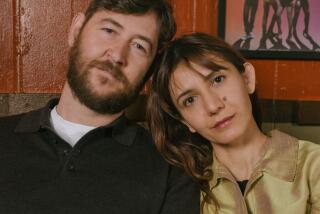Sequel to Du Maurier’s ‘Rebecca’ Is Shrouded by Secrecy . . . and Hype : Literature: Critics wonder how the heroine could adapt to the ‘90s after accepting such a marriage proposal--’I’m asking you to marry me, you little fool.’
- Share via
LONDON — The sequel to “Rebecca,” one of the best-loved British novels of the 20th Century, is being prepared for publication in great secrecy and with a fortune riding on its success.
“Mrs. de Winter,” written by novelist Susan Hill, has been translated into 19 languages and will be published in more than 20 countries--including China and North Korea--on Oct. 4.
“I can think of no other book in the world to which I would have been remotely tempted to write a sequel but ‘Rebecca,’ ” said Hill, who was paid $1 million for her book.
Rebecca, written shortly before World War II, is the story of a naive young woman’s marriage to an older man haunted by the memories of his first wife. It was an immediate best-seller and made writer Daphne du Maurier’s reputation.
Hollywood’s version of “Rebecca,” starring Laurence Olivier and Joan Fontaine as the heroine, whose first name is never divulged, mirrored the book’s success.
It won an Oscar in 1940, and the opening line of the film and the book--”Last night I dreamt I went to Manderley again”--became almost as famous as Rhett Butler’s “Frankly, my dear, I don’t give a damn” in “Gone With the Wind.”
Du Maurier’s executors hope to avoid the fate that befell the sequel to “Gone With the Wind,” called “Scarlett,” which critics universally panned. The novelist died in 1989 at age 81.
Executors will spend about $230,000 promoting “Mrs. de Winter.” The book will be serialized in a national newspaper and read on radio by actress Harriet Walter.
Hill says she took five months to write “Mrs. de Winter,” but few details have been divulged about the book. What little is known is that the heroine will remain anonymous, the book will be told in the first person and the setting has been moved from Cornwall, the far southwest of England where du Maurier lived, north to Gloucestershire.
Publishers Sinclair Stephenson are going to great lengths to keep a lid on the book’s contents. Journalists wishing to review it will be allowed to see only the first chapter before Oct. 4 and must sign a letter of confidentiality.
Dire warnings about the consequences of leaking the contents are contained in the document.
A short extract issued by the publishers shows Hill, whose Victorian spine-chiller “The Woman in Black” has been terrifying audiences at a West End theater since 1988, may have decided to try to repeat du Maurier’s atmospheric writing.
One example:
I bent down. Touched the cool, delicate, creamy, infinitely beautiful petals, the faintly ribbed, heavy leaves, and a sweet scent came into my nostrils from the flowers, intoxicating and yet faintly alarming, seductive, dangerous.
“Rebecca” ends with the couple returning to Manderley, which has been set afire, apparently by the housekeeper, Mrs. Danvers--who serves as the book’s wicked witch in contrast to the heroine’s Cinderella.
For most of the original, the heroine believes her husband still loves Rebecca. But, in fact, he killed her because of her infidelity and sank her body in a boat. It is found by divers after his second marriage, but he escapes arrest.
Critics have had a field day guessing what the future may hold. Some du Maurier fans wonder if a sequel can work because the original is dominated by cruel Mrs. Danvers, the dead Rebecca and Manderley, leaving the rather vacuous de Winters in the shade.
Will the heroine have “grown up” from the timid, gauche wallflower of the first novel? Will she still be reading the cricket scores to her husband to keep him happy?
One critic wants her to become a raging feminist, another a lesbian--a biography of du Maurier suggested she had lesbian tendencies. Most are agreed that the husband, Maxim, would have to change if the marriage was to succeed.
In “Rebecca,” he is portrayed as an upper-class snob addicted to cricket and Manderley, his family home.
What hope is there in the non-sexist 1990s for a man who proposed to his wife with the immortal words: “I’m asking you to marry me, you little fool,” they ask.
Novelist Maeve Binchy said the sequel should begin, “Last night I dreamed I went to see my solicitor and began the whole business of getting shot of Max.”
One intriguing question is whether Mrs. Danvers will return. In the book, she walks out of Manderley shortly before the fire. In the film, she dies in the blaze.
One thing is certain--Hill does not want her novel turned into a Hollywood blockbuster. Two other du Maurier stories, “The Birds” and “Don’t Look Now,” were also made into successful films.
“I will always say no. They cannot persuade me,” she said. “I hated the film. Laurence Olivier had no more idea about Maxim de Winter than a fly in the air.”
More to Read
Sign up for our Book Club newsletter
Get the latest news, events and more from the Los Angeles Times Book Club, and help us get L.A. reading and talking.
You may occasionally receive promotional content from the Los Angeles Times.







